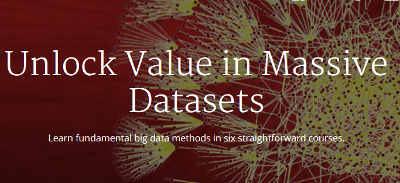| Coursera Intro To Big Data |
| Written by Kay Ewbank | |||
| Thursday, 17 December 2015 | |||
|
A new series of courses on big data is starting from Coursera. This addition to the growing list of specializations, is designed to equip you with a robust set of skills to process, analyze, and extract meaningful information from large amounts of complex data.
The courses are based on the Hadoop ecosystem, and teach the Hadoop platform, its architecture and the tools that make up its ecosystem. There are hands-on instruction and assignments using tools including Spark, Pig, and Hive, along with instruction on strategies for processing massive datasets using the map/reduce framework. If you want a final certificate the specialization consists of five courses and the final Capstone project and if you pay in advance you can make a saving of 10%. You can of course audit the courses for free which gives access to al the course materials. .
The first course in the series is 3 weeks in length requiring 5-6 hours study per week and costs $49. Called An Introduction to Big Data, it is at beginner level and aims to demystify the hype surrounding Big Data, and to give you answers to questions such as "Who are these mysterious data scientists everyone is talking about?", "What kinds of problem-solving skills and knowledge should they have?", and "What kinds of problems can be solved by Big Data technology?". The course also introduces you to the key technical terms and big data tools and applications you'll use in the rest of the courses in the Big Data specialization. The next part of the initial course, "Demystifying Data Science", takes a more in-depth look at what makes a data scientist and the final section, "Getting Started in Hadoop", walks you through downloading and installing Hadoop, and creating your first simple Hadoop program. Each of the other courses last 5 weeks and cost $79. The next in the series is Hadoop Platform and Application Framework, which covers the core tools used to work with and analyze big data, taking you through hands-on examples with Hadoop and Spark frameworks. Introduction to Big Data Analytics comes next, covering basic approaches to querying and exploring data using higher level tools built on top of a Hadoop Platform. Machine Learning With Big Data then covers the open source tools you can use for parallel, distributed and scalable machine learning, and Introduction to Graph Analytics is a broad overview of the field of graph analytics so you can learn new ways to model, store, retrieve and analyze graph-structured data. The final component in the specialization, is Big Data - Capstone Project, which covers the building of a Big Data ecosystem using tools and methods from the earlier courses in this specialization and is only available to fee paying students. The course is from UC San Diago and instructor for the initial course is Natasha Balac, Director of the Predictive Analytics Center of Excellence (PACE) at the San Diego Supercomputer Center. Enrollment for the course starts on December 21 and ends on December 26, and the course runs from December 21 to January 18.
More Information
Related ArticlesCoursera Offers CS Specialization Certificates Coursera's Machine Learning Specialization
To be informed about new articles on I Programmer, sign up for our weekly newsletter,subscribe to the RSS feed and follow us on, Twitter, Facebook, Google+ or Linkedin.
Comments
or email your comment to: comments@i-programmer.info |
|||
| Last Updated ( Monday, 13 June 2016 ) |




